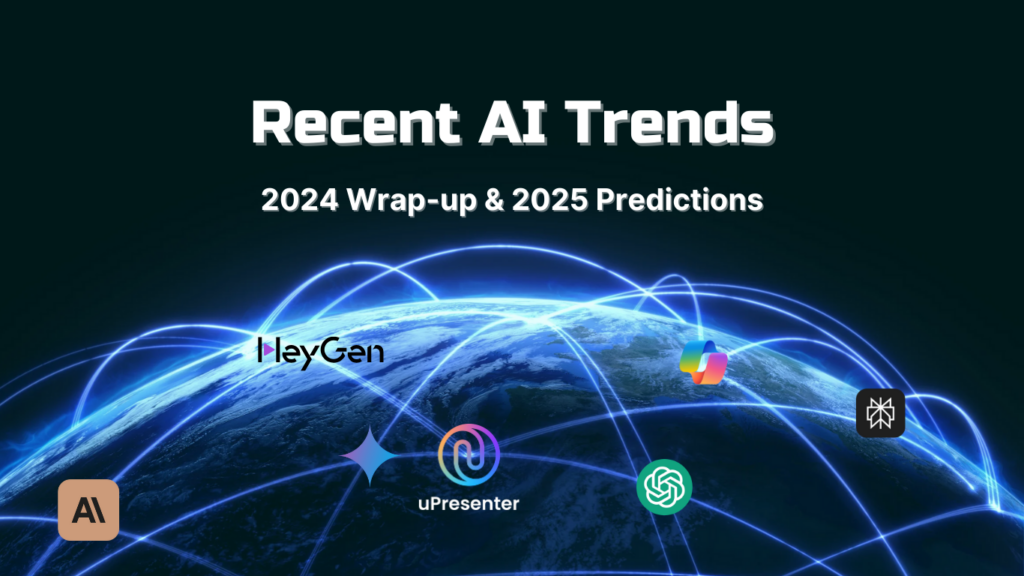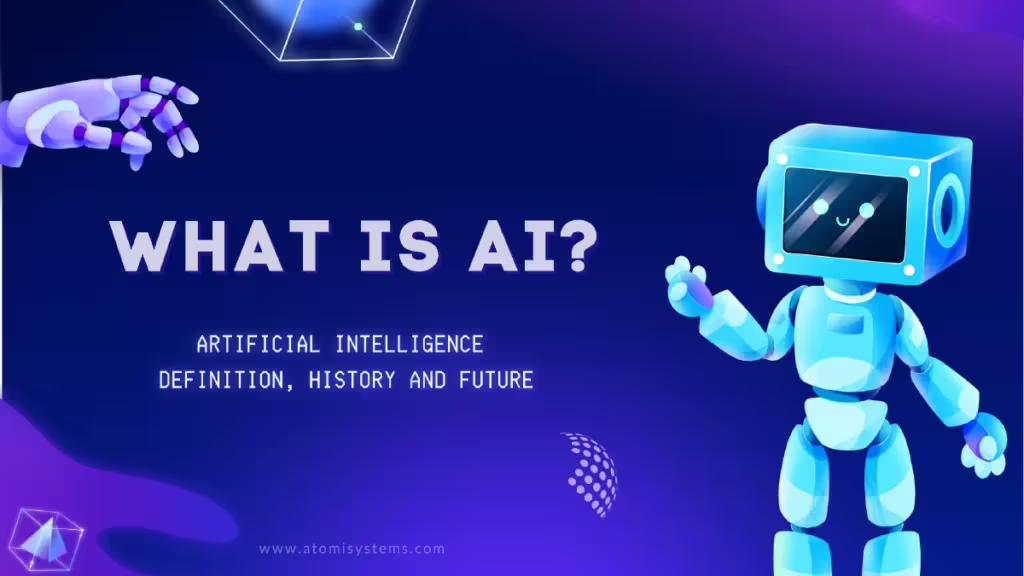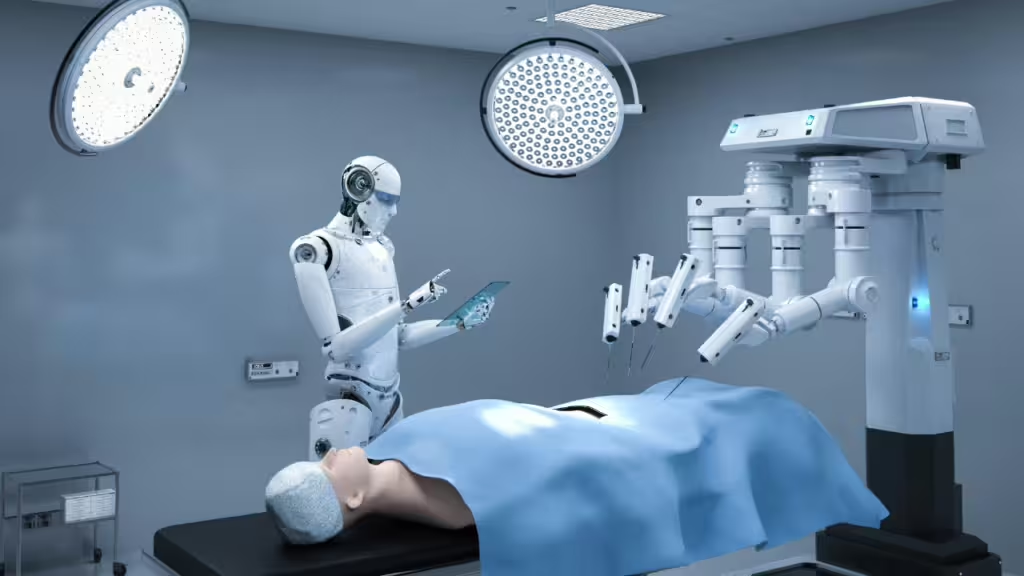Recent Trends in Artificial Intelligence: 2024 Wrap-Up & 2025 Predictions
Artificial Intelligence (AI) continues to evolve at a rapid pace, shaping industries, revolutionizing everyday tasks, and impacting how we interact with technology. As we approach 2025, it’s the perfect time to reflect on recent trends in artificial intelligence that defined 2024 and consider what’s on the horizon for next year. From advances in generative AI and natural language processing to ethical considerations and the integration of AI with the Internet of Things (IoT), this year has seen many impactful developments. In this blog post, we’ll cover these trends and make some predictions for what to expect in 2025.

1. Generative AI: Revolutionizing Content and Creativity
In 2024, generative AI remained one of the most transformative trends in artificial intelligence. Tools like ChatGPT, DALL-E, and other generative models reached new heights, creating text, images, music, and even video with astonishing accuracy and creativity. These models use deep learning to understand patterns in vast datasets, enabling them to produce content that closely mimics human output.
Generative AI’s applications have expanded in 2024, impacting fields like marketing, entertainment, and education. Marketers are using generative AI to create highly customized ad campaigns, while educators are leveraging it to develop interactive learning materials. However, generative AI also raises ethical concerns around copyright and originality, leading to a need for stricter guidelines and policies.
2025 Prediction: Generative AI will become more integrated into daily tasks, with businesses using these models to streamline content production and personalize user experiences. We’ll also see more regulatory frameworks around the ethical use of generative AI to prevent misuse, particularly in copyright-heavy industries.
2. Explainable and Trustworthy AI: Building Transparency and Trust
As AI models become more complex, the demand for transparency is increasing. In 2024, explainable AI (XAI) gained prominence as businesses and organizations sought to understand how AI makes decisions, especially in sensitive fields like healthcare, finance, and law. Trustworthy AI, which includes ethics and transparency, has become a critical focus as people recognize the need for AI systems that are both understandable and accountable.
For example, in healthcare, XAI models are being used to justify diagnoses and recommendations, while financial institutions are using explainable AI to reduce bias in lending decisions. Regulatory bodies around the world are implementing new guidelines to promote fairness, accountability, and transparency.
2025 Prediction: As AI usage becomes more widespread, companies will increasingly prioritize explainable AI to comply with regulatory standards and earn user trust. AI tools with built-in transparency features will see greater adoption, especially as consumers become more aware of AI’s impact on privacy and fairness.
3. AI in Healthcare: Precision Medicine and Early Diagnostics
The healthcare industry continues to be transformed by AI innovations, and in 2024, AI-powered diagnostics, drug discovery, and precision medicine were major focuses. AI’s ability to analyze vast amounts of medical data has enabled earlier and more accurate diagnoses, especially in areas like oncology, where early intervention is critical.
AI is also streamlining drug discovery by predicting effective drug combinations and potential treatments. In personalized medicine, AI is helping doctors customize treatment plans to better fit individual patients, which has led to better outcomes and a reduction in adverse effects.
2025 Prediction: In 2025, we can expect even more integration of AI in healthcare, especially as regulatory bodies approve more AI-powered diagnostic tools. AI will also likely expand its role in telemedicine, where it can assist doctors with remote patient assessments, offering more personalized and efficient care.
4. The Rise of Edge AI and IoT Integration
In 2024, edge AI, where data processing happens on local devices rather than on centralized servers, continued to gain traction. This trend has been particularly impactful in industries like automotive, industrial automation, and smart cities, where real-time data processing is essential. Edge AI reduces latency, enhances privacy, and makes it possible to perform complex tasks even in remote areas with limited internet connectivity.
Combining edge AI with the Internet of Things (IoT) has enabled smart homes, smart cities, and intelligent industrial operations. Smart cities are using IoT and edge AI to manage traffic, reduce pollution, and improve public safety.
2025 Prediction: In 2025, we will likely see more edge AI applications across different sectors. As 5G becomes more accessible, edge AI will power more smart devices, from connected cars to wearables. Expect to see innovations in autonomous transportation and smart cities, as these technologies rely on edge processing for efficiency and safety.
5. Advances in Natural Language Processing (NLP)
Natural language processing (NLP) is an area of artificial intelligence that focuses on the interaction between computers and human language. In 2024, NLP has reached new milestones, with AI systems better understanding nuances, context, and sentiment in human communication. Tools like ChatGPT and Google’s BERT have improved conversational AI capabilities, making virtual assistants and customer service bots more efficient and responsive.
This year, businesses have increasingly adopted NLP-powered tools for customer service, translation, and content generation. NLP advancements also play a significant role in sectors like education and healthcare, where understanding context and language is essential.
2025 Prediction: By 2025, NLP technology will become even more advanced, likely leading to AI assistants capable of holding richer, more contextually aware conversations. We might also see a surge in multi-language conversational AI, which could further break down language barriers in business and education.
6. AI in Cybersecurity: Proactive Threat Detection
Cybersecurity threats have grown in sophistication, and in response, AI-powered cybersecurity solutions have become essential. In 2024, AI-driven security systems have been widely adopted to detect and neutralize threats in real time. Machine learning algorithms are now capable of spotting patterns in vast datasets, allowing them to detect unusual behavior that may indicate cyberattacks.
With data breaches on the rise, organizations are relying on AI to protect sensitive data and prevent fraud. AI is particularly beneficial in identifying phishing attempts, securing online transactions, and monitoring network security.
2025 Prediction: In 2025, we can expect a further increase in the use of AI in cybersecurity, especially as more businesses go digital. Proactive threat detection and response will become standard, with AI systems using predictive analysis to stop potential threats before they materialize. AI in cybersecurity will also extend to personal devices, offering more security for individual users.
7. Ethical AI and Regulatory Frameworks
With AI’s expanding role, ethical considerations are more important than ever. In 2024, there was a push for ethical AI frameworks that prioritize fairness, accountability, and transparency. Governments and organizations are creating new regulations to ensure that AI development aligns with societal values and respects user privacy.
This trend is essential as AI’s applications grow, especially in areas like surveillance, hiring, and lending, where AI decisions can impact people’s lives in significant ways. Regulatory bodies like the European Union have made strides toward comprehensive AI regulations, setting the stage for more global standards.
2025 Prediction: Expect to see more countries implement AI regulations that promote responsible use, privacy protection, and transparency. Ethical AI development will become a competitive advantage for companies, as consumers and clients favor businesses that prioritize responsible and trustworthy AI practices.
Conclusion
Reflecting on the recent trends in artificial intelligence from 2024, it’s clear that AI is advancing on many fronts, reshaping how we live and work. Generative AI, explainable AI, edge computing, NLP, and AI in cybersecurity have all shown remarkable growth. As we move into 2025, we can anticipate even greater developments, with AI continuing to transform industries, enhance user experiences, and support new possibilities.
As the AI landscape evolves, staying informed about recent trends in artificial intelligence will be crucial for anyone looking to harness the power of AI in their personal or professional life. Embracing AI responsibly and ethically will ensure that this powerful technology continues to bring value to society in 2025 and beyond.
Overview of AI (Artificial Intelligence)
AI, or artificial intelligence, is a term we frequently hear, but what does it mean? In this blog, let’s grab an overview of AI with the definition, history, and its future impact.
There is no doubt that artificial intelligence (AI) is one of the hottest buzzwords in technology today. It is an ever-evolving force that is continuously reshaping our world in profound ways. This transformative technology has gotten into almost every facet of our lives, from the devices we use daily to the industries that power our economies. As we look to the future, AI has the potential to help solve big problems like climate change, and energy issues, use resources wisely, and make healthcare fair for everyone. The impact of AI on the world is a constantly evolving narrative. Its transformative potential knows no bounds, leaving us with a world that is continually and dynamically changed by its presence. Let’s dive deeper into the article for an overview of AI.

What is AI?
AI, which stands for Artificial Intelligence, is a branch of computer science that focuses on creating systems and machines capable of performing tasks that typically require human intelligence. These tasks include understanding natural language, recognizing patterns, solving complex problems, learning from experience, and making decisions.
How about AI History?
There has been a long development in AI history. The foundation for AI was laid in the early 1900s, with the most significant advancements not occurring until the 1950s. Right now, artificial intelligence is important in jobs like figuring out the order of RNA for vaccines and imitating how humans talk. These tasks rely a lot on computer programs and patterns, focusing on understanding, thinking, and generalizing. AI has become even more important with these new ideas, becoming a big deal like never before. It looks like it’s going to stay important in the future too.

We cannot mention robots, chatbots, driverless cars, Google Maps, etc, and yes, ChatGPT, and BingChat – the two AI-powered assistants that can interact and respond to almost all the question types. They are artificial intelligence products. In the next part of the article overview of AI, we’ll walk you through its impacts.
How Will AI Impact the Future?
As we can see, the current advancements in artificial intelligence are progressing exceptionally rapidly. The forthcoming era of AI holds boundless opportunities and practical applications that promise to streamline our daily lives significantly. As a result, it will positively impact humanity’s future. So, what will be the implications of artificial intelligence in the future? Let’s explore now!
AI in Education
AI in education is set to revolutionize the learning process for individuals of all ages. By leveraging machine learning, natural language processing, and facial recognition, AI facilitates the digitization of textbooks, identification of plagiarism, and assessment of students’ emotions. This helps identify those who may be struggling or disengaged. Presently and in the future, artificial intelligence customizes the learning experience to meet the unique needs of each student. The AI-powered presentation & quiz generators like uPresenter can save you tons of time and effort in creating learning content.

Additionally, what do you think about AI robot tutors? Yes, they can assist teachers and help enhance the educational experience and quality of learning.
AI in Healthcare
Scientists are studying how AI can help in medicine. artificial intelligence might make it easier for doctors to diagnose and treat illnesses early. It could also create new ways to treat problems like dementia and cancer. AI might even predict future illnesses by looking at a person’s health history and genes. This can help make plans to prevent problems before they happen.

While the roles of doctors, nurses, scientists, and others will remain indispensable, AI is expected to make our lives easier. It does this by making the information from doctors and health data more useful.
AI in Transportation
We heard about driverless cars or trains, so, what about driverless airplanes?

AI is opening in a transformative era for the transportation sector. Advances in artificial intelligence are shaping the present and future of transportation. They are especially influencing the groundbreaking development of applications for autonomous vehicles. As AI technologies mature, we anticipate a comprehensive redefinition of how transportation systems are conceived, designed, and operated. Artificial intelligence will have a big impact, making things like finding the best routes and managing traffic better. It will also improve safety features and how fuel is used, pushing the industry into a new era of efficiency, safety, and sustainability. Combining AI with transportation changes how things move around. It also opens up new ideas for clever, connected city spaces.
AI in Service Industry
The images of robots seamlessly taking over tasks typically handled by assistant staff in airports, cafes, or internal settings are not only visually striking but also hold the promise of enhanced efficiency. These automated entities not only demonstrate precision and effectiveness in their operations but also contribute to saving human energy. The potential impact goes beyond these initial settings, as the trajectory suggests an increasing substitution of human labor by robots and machines.

Looking forward, there is a possibility that customer service representatives, cashiers, and even cooks may be replaced by robots and machines driven by artificial intelligence. This transformative shift in the labor landscape prompts contemplation on the evolving role of automation in diverse sectors and the potential implications it carries for employment dynamics and human-machine collaboration.
AI in Cybersecurity
The increasing frequency of cybersecurity incidents in recent years has raised concerns among many corporate leaders. In response to this growing threat, artificial intelligence emerged as a strong ally in strengthening cybersecurity defenses. AI is crucial for detecting and preventing cyber threats by carefully analyzing network traffic, identifying anomalies, and predicting potential attacks. Its capabilities go beyond traditional methods, allowing for advanced threat detection and response mechanisms that greatly improve the overall security of systems and data. As businesses navigate the changing landscape of cyber threats, integrating artificial intelligence into cybersecurity strategies becomes a vital step in proactively protecting against a wide range of risks and vulnerabilities.

As such, the role of artificial intelligence is rapidly evolving, shaping various aspects of our lives and industries. From revolutionizing healthcare and transforming transportation to enhancing cybersecurity and simplifying daily tasks, AI’s impact is both profound and diverse.
Final Words
That’s an overview of AI. Begin with the question “What is AI”, then you walk through the history and the future of AI in our lives. As we look to the future, the potential applications of artificial intelligence seem boundless, promising unprecedented advancements in technology, efficiency, and problem-solving.

However, ethical considerations, responsible development, and thoughtful integration into society will be crucial to harnessing the full benefits of AI while navigating potential challenges. The journey into the future of AI holds exciting possibilities, encouraging us to embrace innovation responsibly and adapt to a world where the collaboration between humans and intelligent machines becomes increasingly knit.
See also:

